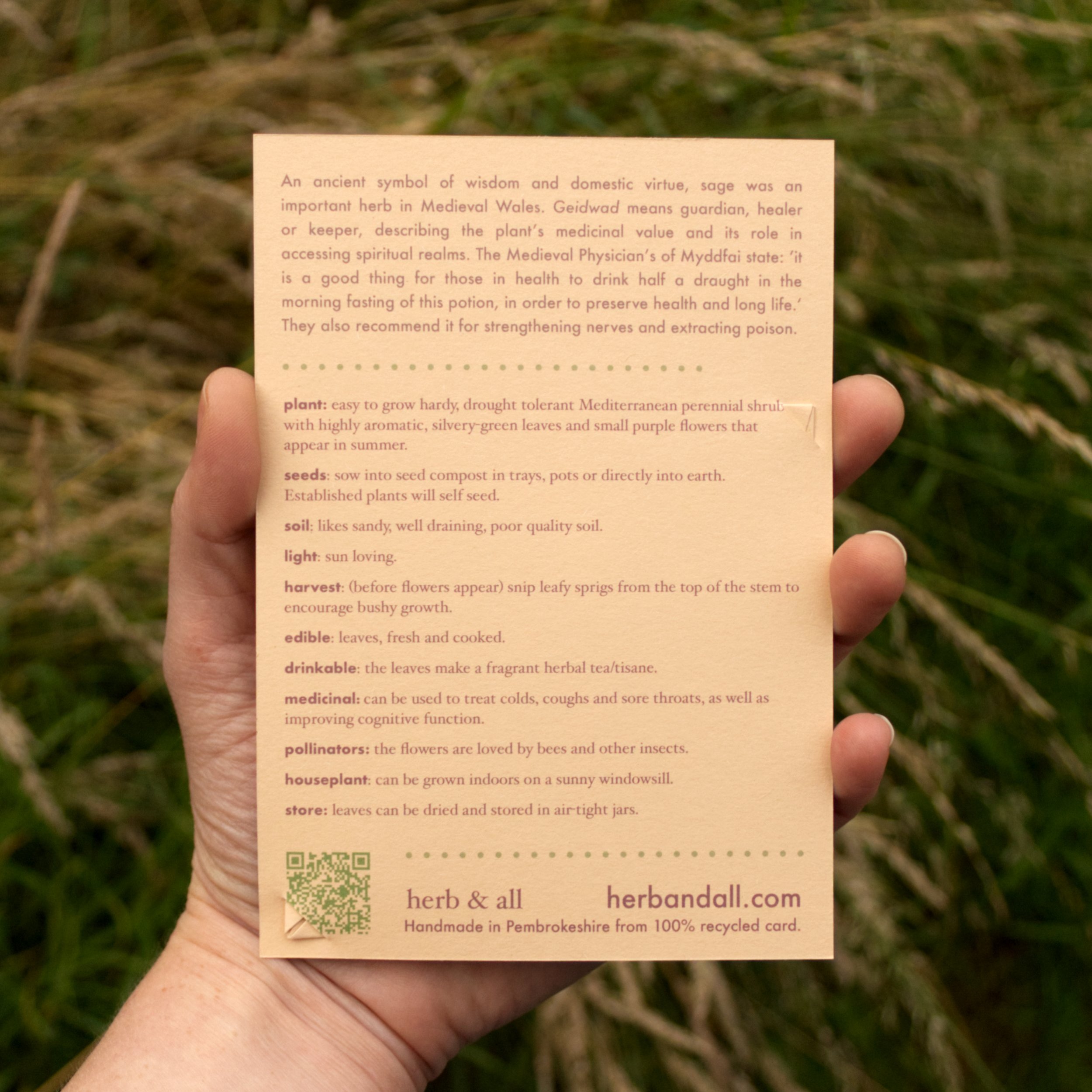 Image 1 of 5
Image 1 of 5

 Image 2 of 5
Image 2 of 5

 Image 3 of 5
Image 3 of 5

 Image 4 of 5
Image 4 of 5

 Image 5 of 5
Image 5 of 5






geidwad: welsh sage seeds
Illustrated pack of sage seeds featuring Welsh plant names and folklore, as well as instructions for how to sow, grow, eat, drink and use the plant.
An ancient symbol of wisdom and domestic virtue, sage was an important herb in Medieval Wales. Geidwad means guardian, healer or keeper, describing the plant’s medicinal value and its role in accessing spiritual realms. The Medieval Physician’s of Myddfai state: ‘it is a good thing for those in health to drink half a draught in the morning fasting of this potion, in order to preserve health and long life.’ They also recommend it for strengthening nerves and extracting poison.
plant: easy to grow hardy, drought tolerant Mediterranean perennial shrub with highly aromatic, silvery-green leaves and small purple flowers that appear in summer.
seeds: sow into seed compost in trays, pots or directly into earth. Established plants will self seed.
soil: likes sandy, well draining, poor quality soil.
light: sun loving.
harvest: (before flowers appear) snip leafy sprigs from the top of the stem to encourage bushy growth.
edible: leaves, fresh and cooked.
drinkable: the leaves make a fragrant herbal tea/tisane.
medicinal: can be used to treat colds, coughs and sore throats, as well as improving cognitive function.
pollinators: the flowers are loved by bees and other insects.
houseplant: can be grown indoors on a sunny windowsill.
store: leaves can be dried and stored in air-tight jars.
Approx 100 seeds, organically produced in Cornwall. Packaging designed and made by hand in Pembrokeshire, Wales, from 100% recycled content.
Illustrated pack of sage seeds featuring Welsh plant names and folklore, as well as instructions for how to sow, grow, eat, drink and use the plant.
An ancient symbol of wisdom and domestic virtue, sage was an important herb in Medieval Wales. Geidwad means guardian, healer or keeper, describing the plant’s medicinal value and its role in accessing spiritual realms. The Medieval Physician’s of Myddfai state: ‘it is a good thing for those in health to drink half a draught in the morning fasting of this potion, in order to preserve health and long life.’ They also recommend it for strengthening nerves and extracting poison.
plant: easy to grow hardy, drought tolerant Mediterranean perennial shrub with highly aromatic, silvery-green leaves and small purple flowers that appear in summer.
seeds: sow into seed compost in trays, pots or directly into earth. Established plants will self seed.
soil: likes sandy, well draining, poor quality soil.
light: sun loving.
harvest: (before flowers appear) snip leafy sprigs from the top of the stem to encourage bushy growth.
edible: leaves, fresh and cooked.
drinkable: the leaves make a fragrant herbal tea/tisane.
medicinal: can be used to treat colds, coughs and sore throats, as well as improving cognitive function.
pollinators: the flowers are loved by bees and other insects.
houseplant: can be grown indoors on a sunny windowsill.
store: leaves can be dried and stored in air-tight jars.
Approx 100 seeds, organically produced in Cornwall. Packaging designed and made by hand in Pembrokeshire, Wales, from 100% recycled content.
Illustrated pack of sage seeds featuring Welsh plant names and folklore, as well as instructions for how to sow, grow, eat, drink and use the plant.
An ancient symbol of wisdom and domestic virtue, sage was an important herb in Medieval Wales. Geidwad means guardian, healer or keeper, describing the plant’s medicinal value and its role in accessing spiritual realms. The Medieval Physician’s of Myddfai state: ‘it is a good thing for those in health to drink half a draught in the morning fasting of this potion, in order to preserve health and long life.’ They also recommend it for strengthening nerves and extracting poison.
plant: easy to grow hardy, drought tolerant Mediterranean perennial shrub with highly aromatic, silvery-green leaves and small purple flowers that appear in summer.
seeds: sow into seed compost in trays, pots or directly into earth. Established plants will self seed.
soil: likes sandy, well draining, poor quality soil.
light: sun loving.
harvest: (before flowers appear) snip leafy sprigs from the top of the stem to encourage bushy growth.
edible: leaves, fresh and cooked.
drinkable: the leaves make a fragrant herbal tea/tisane.
medicinal: can be used to treat colds, coughs and sore throats, as well as improving cognitive function.
pollinators: the flowers are loved by bees and other insects.
houseplant: can be grown indoors on a sunny windowsill.
store: leaves can be dried and stored in air-tight jars.
Approx 100 seeds, organically produced in Cornwall. Packaging designed and made by hand in Pembrokeshire, Wales, from 100% recycled content.